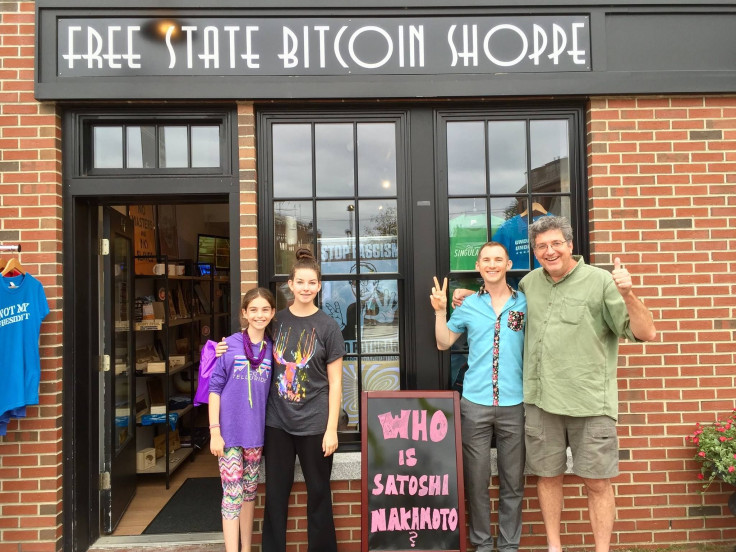New Hampshire Is A Libertarian Bitcoin Paradise, Especially For Preppers

Bitcoin prices rose above $8,000 for the first time on Friday and continued the steady ascension over the weekend. By Monday, Coin Market Cap listed the price at $8,238. Forbes reported the bitcoin network now processes $2 billion worth of transactions every day.
Meanwhile, many doomsday preppers are starting to warm up to bitcoin, especially since Blockstream now freely broadcasts the bitcoin network from satellites. With the help of a generator and a Wi-Fi repeater, rural bitcoin users can still operate as network nodes regardless of local electricity infrastructures.
“Not too long ago, people in the prepper community were actively warning against crypto, and now they’re all investing in it,” Tom Martin, a truck driver who also runs a survival skills site, told Bloomberg. “As long as the grid stays up, people will keep using bitcoin.”
The Free State Project, a Libertarian organization that inspired 20,000 people to say they will move to bitcoin-friendly New Hampshire over the next few years, now regularly publishes local bitcoin news on the community’s blog. For example, the Free State Bitcoin Shoppe recently opened a real shop in Portsmouth with libertarian art, cryptocurrency themed gifts and free consultations for beginners. The shop only accepts cryptocurrency.
“We will accept any cryptocurrency as long as we can both figure it out and as long as it has no legal monopoly," shop co-founder Steven Zeiler told International Business Times. “Especially in this part of New Hampshire where we live, people like to be very independent. They don’t want to be reliant on large, central organizations.” There’s even a local Free State Blockchain digital assets conference coming up in December.
“Bitcoin users seem to share a distrust in the government. Or maybe enough knowledge of history that makes them pessimistic about the government and freedom,” prepper and bitcoin enthusiast Julie Silversmyth wrote in her Steemit blog. “One thing a prepper would do is never put all her eggs in one basket. She'll store some cash in the bank, some hidden outside the bank, some in crypto, some in food supplies.”

None of this is to suggest bitcoin is impervious to catastrophe. It still takes an exorbitant amount of energy to mine cryptocurrency, not to mention how clogged the network would become if a significant number of nodes, miners or bitcoin developers suddenly lost internet access. However, there are already solutions for people who need to use cryptocurrency in a tangible transaction without the internet such as bctip cards. They are kind of like bitcoin coupons printed with a QR code and a unique URL.
“People have made these cards that have a small amount of bitcoin on them, that you can pass around and later redeem once you have access to the internet or once you get a bitcoin app,” Zeiler said. “I’ve given out hundreds of them.” His shop also offers tours of bitcoin-friendly businesses around town. Beyond Portsmouth, the off-the-grid homesteaders of Bardo Farm a few hours away also sell a variety of meats and vegetables for cryptocurrency.

The growing communities of bitcoin survivalists contradict stereotypes about doomsday preppers. This isn't just a trend among outdoorsy or religious cliques. People with all kinds of backgrounds see cryptocurrency as a tool to help to protect themselves from the fallout of potential economic disasters.
“There’s a bunch of us in [Silicon] Valley. We meet up and have these financial-hacking dinners and talk about backup plans people are doing,” Tim Chang, managing director at the venture capital firm Mayfield Fund, told the New Yorker. “It runs the gamut from a lot of people stocking up on Bitcoin and cryptocurrency, to figuring out how to get second passports if they need it, to having vacation homes in other countries that could be escape havens.”
In the meantime, bitcoin users like Zeiler are working to help people beyond the tech industry get on board. His team is also part of the software development group that created Anypay, a free app dozens of shopkeepers in New Hampshire are already using to accept cryptocurrency at the point of sale. Retailers can download the app on their tablets or iPads to accept bitcoin and dash.
“The great thing about this system is the money goes instantly from the customer to the business owner’s personal wallet. There’s no intermediary or fees in between,” Zeiler said. “Definitely, we have plans to take it broader."
© Copyright IBTimes 2024. All rights reserved.











